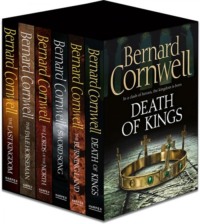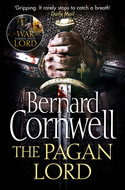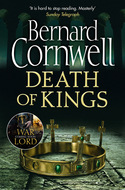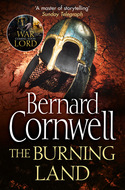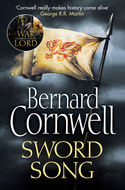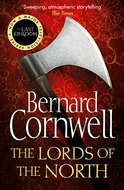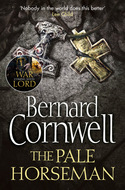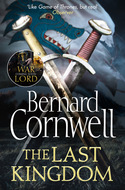Kitap dosya olarak indirilemez ancak uygulamamız üzerinden veya online olarak web sitemizden okunabilir.
Kitabı oku: «The Last Kingdom Series Books 1-6», sayfa 25
‘I did.’
‘That’s what I hear.’ He sneezed again. ‘You know Edor?’
‘I know him,’ I said. Edor was one of Ealdorman Odda’s battle chiefs, a warrior of the men of Defnascir, and he had fought beside us at Cynuit.
‘Edor told me what happened,’ Wulfhere said, ‘but only because he trusts me. For God’s sake stop fidgeting!’ This last shout was directed at Æthelwold who was poking beneath the altar’s linen cover, presumably in search of something valuable. Alfred, rather than murder his nephew, seemed intent on boring him to death. Æthelwold had never been allowed to fight, lest he make a reputation for himself, instead he had been forced to learn his letters, which he hated, and so he idled his time away, hunting, drinking, whoring and filled with resentment that he was not the king. ‘Just stand still, boy,’ Wulfhere snarled.
‘Edor told you,’ I said, unable to keep the outrage from my voice, ‘because he trusts you? You mean what happened at Cynuit is a secret? A thousand men saw me kill Ubba!’
‘But Odda the Younger took the credit,’ Wulfhere said, ‘and his father is badly wounded and if he dies then Odda the Younger will become one of the richest men in Wessex, and he’ll lead more troops and pay more priests than you can ever hope to do, so men won’t want to offend him, will they? They’ll pretend to believe him, to keep him generous. And the king already believes him, and why shouldn’t he? Odda arrived here with Ubba Lothbrokson’s banner and war axe. He dropped them at Alfred’s feet, then knelt and gave the praise to God, and promised to build a church and monastery at Cynuit, and what did you do? Ride a damned horse into the middle of mass and wave your sword about. Not a clever thing to do with Alfred.’
I half smiled at that, for Wulfhere was right. Alfred was uncommonly pious, and a sure way to succeed in Wessex was to flatter that piety, imitate it and ascribe all good fortune to God.
‘Odda’s a prick,’ Wulfhere growled, surprising me, ‘but he’s Alfred’s prick now, and you’re not going to change that.’
‘But I killed …’
‘I know what you did!’ Wulfhere interrupted me. ‘And Alfred probably suspects you’re telling the truth, but he believes Odda made it possible. He thinks Odda and you both fought Ubba. He may not even care if neither of you did, except that Ubba’s dead and that’s good news, and Odda brought that news and so the sun shines out of Odda’s arse, and if you want the king’s troops to hang you off a high branch then you’ll make a feud with Odda. Do you understand me?’
‘Yes.’
Wulfhere sighed. ‘Leofric said you’d see sense if I beat you over the head long enough.’
‘I want to see Leofric,’ I said.
‘You can’t,’ Wulfhere said sharply. ‘He’s being sent back to Hamtun where he belongs. But you’re not going back. The fleet will be put in someone else’s charge. You’re to do penance.’
For a moment I thought I had misheard. ‘I’m to do what?’ I asked.
‘You’re to grovel,’ Æthelwold spoke for the first time. He grinned at me. We were not exactly friends, but we had drunk together often enough and he seemed to like me. ‘You’re to dress like a girl,’ Æthelwold continued, ‘go on your knees and be humiliated.’
‘And you’re to do it right now,’ Wulfhere added.
‘I’ll be damned …’
‘You’ll be damned anyway,’ Wulfhere snarled at me, then snatched the white bundle from Æthelwold’s grasp and tossed it at my feet. It was a penitent’s robe, and I left it on the ground. ‘For God’s sake, lad,’ Wulfhere said, ‘have some sense. You’ve got a wife and land here, don’t you? So what happens if you don’t do the king’s bidding? You want to be outlawed? You want your wife in a nunnery? You want the church to take your land?’
I stared at him. ‘All I did was kill Ubba and tell the truth.’
Wulfhere sighed. ‘You’re a Northumbrian,’ he said, ‘and I don’t know how they did things up there, but this is Alfred’s Wessex. You can do anything in Wessex except piss all over his church, and that’s what you just did. You pissed, son, and now the church is going to piss all over you.’ He grimaced as the rain beat harder on the tent, then he frowned, staring at the puddle spreading just outside the entrance. He was silent a long time, before turning and giving me a strange look. ‘You think any of this is important?’
I did, but I was so astonished by his question, which had been asked in a soft, bitter voice, that I had nothing to say.
‘You think Ubba’s death makes any difference?’ he asked, and again I thought I had misheard. ‘And even if Guthrum makes peace,’ he went on, ‘you think we’ve won?’ His heavy face was suddenly savage. ‘How long will Alfred be king? How long before the Danes rule here?’
I still had nothing to say. Æthelwold, I saw, was listening intently. He longed to be king, but he had no following, and Wulfhere had plainly been appointed as his guardian to keep him from making trouble. But Wulfhere’s words suggested the trouble would come anyway. ‘Just do what Alfred wants,’ the ealdorman advised me, ‘and afterwards find a way to keep living. That’s all any of us can do. If Wessex falls we’ll all be looking for a way to stay alive, but in the meantime put on that damned robe and get it over with.’
‘Both of us,’ Æthelwold said, and he picked up the robe and I saw he had fetched two of them, folded together.
‘You?’ Wulfhere snarled at him. ‘Are you drunk?’
‘I’m penitent for being drunk. Or I was drunk, now I’m penitent.’ He grinned at me, then pulled the robe over his head. ‘I shall go to the altar with Uhtred,’ he said, his voice muffled by the linen.
Wulfhere could not stop him, but Wulfhere knew, as I knew, that Æthelwold was making a mockery of the rite. And I knew Æthelwold was doing it as a favour to me, though as far as I knew he owed me no favour. But I was grateful to him, so I put on the damned frock and, side by side with the king’s nephew, went to my humiliation.
I meant little to Alfred. He had a score of great lords in Wessex, while across the frontier in Mercia there were other lords and thegns who lived under Danish rule but who would fight for Wessex if Alfred gave them an opportunity. All of those great men could bring him soldiers, could rally swords and spears to the dragon banner of Wessex, while I could bring him nothing except my sword, Serpent-Breath. True, I was a lord, but I was from far off Northumbria and I led no men and so my only value to him was far in the future. I did not understand that yet. In time, as the rule of Wessex spread northwards, my value grew, but back then, in 877, when I was an angry twenty-year-old, I knew nothing except my own ambitions.
And I learned humiliation. Even today, a lifetime later, I remember the bitterness of that penitential grovel. Why did Alfred make me do it? I had won him a great victory, yet he insisted on shaming me, and for what? Because I had disturbed a church service? It was partly that, but only partly. He loved his god, loved the church and passionately believed that the survival of Wessex lay in obedience to the church and so he would protect the church as fiercely as he would fight for his country. And he loved order. There was a place for everything and I did not fit and he genuinely believed that if I could be brought to God’s heel then I would become part of his beloved order. In short he saw me as an unruly young hound that needed a good whipping before it could join the disciplined pack.
So he made me grovel.
And Æthelwold made a fool of himself.
Not at first. At first it was all solemnity. Every man in Alfred’s army was there to watch, and they made two lines in the rain. The lines stretched to the altar under the guyed sail-cloth where Alfred and his wife waited with the bishop and a gaggle of priests. ‘On your knees,’ Wulfhere said to me. ‘You have to go on your knees,’ he insisted tonelessly, ‘and crawl up to the altar. Kiss the altar cloth, then lie flat.’
‘Then what?’
‘Then God and the king forgive you,’ he said, and waited. ‘Just do it,’ he snarled.
So I did it. I went down on my knees and I shuffled through the mud, and the silent lines of men watched me, and then Æthelwold, close beside me, began to wail that he was a sinner. He threw his arms in the air, fell flat on his face, howled that he was penitent, shrieked that he was a sinner, and at first men were embarrassed and then they were amused. ‘I’ve known women!’ Æthelwold shouted at the rain, ‘and they were bad women! Forgive me!’
Alfred was furious, but he could not stop a man making a fool of himself before God. Perhaps he thought Æthelwold’s remorse was genuine? ‘I’ve lost count of the women!’ Æthelwold shouted, then beat his fists in the mud. ‘Oh God, I love tits! God, I love naked women, God, forgive me for that!’ The laughter spread, and every man must have remembered that Alfred, before piety caught him in its clammy grip, had been notorious for the women he had pursued. ‘You must help me, God!’ Æthelwold cried as we shuffled a few feet farther. ‘Send me an angel!’
‘So you can hump her?’ a voice called from the crowd and the laughter became a roar.
Ælswith was hurried away, lest she hear something unseemly. The priests whispered together, but Æthelwold’s penitence, though extravagant, seemed real enough. He was weeping. I knew he was really laughing, but he howled as though his soul was in agony. ‘No more tits, God!’ he called, ‘no more tits!’ He made a fool of himself, but, as men already thought him a fool, he did not mind. ‘Keep me from tits, God!’ he shouted, and now Alfred left, knowing that the solemnity of the day was ruined, and most of the priests left with him, so that Æthelwold and I crawled to an abandoned altar where Æthelwold turned in his mud-spattered robe and leaned against the table. ‘I hate him,’ he said softly, and I knew he referred to his uncle. ‘I hate him,’ he went on, ‘and now you owe me a favour, Uhtred.’
‘I do,’ I said.
‘I’ll think of one,’ he said.
Odda the Younger had not left with Alfred. He seemed bemused. My humiliation, which he had surely thought to enjoy, had turned into laughter and he was aware that men were watching him, judging his truthfulness, and he moved closer to a huge man who was evidently one of his bodyguards. That man was tall and very broad about the chest, but it was his face that commanded attention for it looked as though his skin had been stretched too tight across his skull, leaving his face incapable of making any expression other than one of pure hatred and wolfish hunger. Violence came off the man like the stench of a wet hound and when he looked at me it was like a beast’s soulless stare, and I instinctively understood that this was the man who would kill me if Odda found a chance to commit murder. Odda was nothing, a rich man’s spoiled son, but his money gave him the means to command men who were killers. Then Odda plucked at the tall man’s sleeve and they both turned and walked away.
Father Beocca had stayed by the altar. ‘Kiss it,’ he ordered me, ‘then lie flat.’
I stood up instead. ‘You can kiss my arse, father,’ I said. I was angry, and my anger frightened Beocca who backed away.
But I had done what the king wanted. I had been penitent.
The tall man beside Odda the Younger was named Steapa. Steapa Snotor, men called him, or Steapa the Clever. ‘It’s a joke,’ Wulfhere told me as I ripped off the penitent’s frock and pulled on my mail coat.
‘A joke?’
‘Because he’s dumb as an ox,’ Wulfhere said. ‘He’s got frog spawn instead of a brain. He’s stupid, but he’s not a stupid fighter. You didn’t see him at Cynuit?’
‘No,’ I said curtly.
‘So what’s Steapa to you?’ Wulfhere asked.
‘Nothing,’ I said. I had asked the ealdorman who Odda’s bodyguard was so that I could learn the name of the man who might try to kill me, but that possible murder was none of Wulfhere’s business.
Wulfhere hesitated, wanting to ask more, then deciding he would fetch no better answer. ‘When the Danes come,’ he said, ‘you’ll be welcome to join my men.’
Æthelwold, Alfred’s nephew, was holding my two swords and he drew Serpent-Breath from her scabbard and stared at the wispy patterns in her blade. ‘If the Danes come,’ he spoke to Wulfhere, ‘you must let me fight.’
‘You don’t know how to fight.’
‘Then you must teach me.’ He slid Serpent-Breath back into the scabbard. ‘Wessex needs a king who can fight,’ he said, ‘instead of pray.’
‘You should watch your tongue, lad,’ Wulfhere said, ‘in case it gets cut out.’ He snatched the swords from Æthelwold and gave them to me. ‘The Danes will come,’ he said, ‘so join me when they do.’
I nodded, but said nothing. When the Danes came, I thought, I planned to be with them. I had been raised by Danes after being captured at the age of ten and they could have killed me, but instead they had treated me well. I had learned their language and worshipped their gods until I no longer knew whether I was Danish or English. Had Earl Ragnar the Elder lived I would never have left them, but he had died, murdered in a night of treachery and fire, and I had fled south to Wessex. But now I would go back. Just as soon as the Danes left Exanceaster I would join Ragnar’s son, Ragnar the Younger, if he lived. Ragnar the Younger’s ship had been in the fleet which had been hammered in the great storm. Scores of ships had sunk, and the remnants of the fleet had limped to Exanceaster where the boats were now burned to ash on the riverbank beneath the town. I did not know if Ragnar lived. I hoped he lived, and I prayed he would escape Exanceaster and then I would go to him, offer him my sword, and carry that blade against Alfred of Wessex. Then, one day, I would dress Alfred in a frock and make him crawl on his knees to an altar of Thor. Then kill him.
Those were my thoughts as we rode to Oxton. That was the estate Mildrith had brought me in marriage and it was a beautiful place, but so saddled with debt that it was more of a burden than a pleasure. The farmland was on the slopes of hills facing east towards the broad sea-reach of the Uisc and above the house were thick woods of oak and ash from which flowed small clear streams that cut across the fields where rye, wheat and barley grew. The house, it was not a hall, was a smoke-filled building made from mud, dung, oak and rye-straw, and so long and low that it looked like a green, moss-covered mound from which smoke escaped through the roof’s central hole. In the attached yard were pigs, chickens and mounds of manure as big as the house. Mildrith’s father had farmed it, helped by a steward named Oswald who was a weasel, and he caused me still more trouble on that rainy Sunday as we rode back to the farm.
I was furious, resentful and vengeful. Alfred had humiliated me which made it unfortunate for Oswald that he had chosen that Sunday afternoon to drag an oak tree down from the high woods. I was brooding on the pleasures of revenge as I let my horse pick its way up the track through the trees and saw eight oxen hauling the great trunk towards the river. Three men were goading the oxen, while a fourth, Oswald, rode the trunk with a whip. He saw me and jumped off and, for a heartbeat, it looked as if he wanted to run into the trees, but then he realised he could not evade me and so he just stood and waited as I rode up to the great oak log.
‘Lord,’ Oswald greeted me. He was surprised to see me. He probably thought I had been killed with the other hostages, and that belief had made him careless.
My horse was nervous because of the stink of blood from the oxen’s flanks and he stepped backwards and forwards in small steps until I calmed him by patting his neck. Then I looked at the oak trunk that must have been forty feet long and as thick about as a man is tall. ‘A fine tree,’ I said to Oswald.
He glanced towards Mildrith who was twenty paces away. ‘Good day, lady,’ he said, clawing off the woollen hat he wore over his springy red hair.
‘A wet day, Oswald,’ she said. Her father had appointed the steward and Mildrith had an innocent faith in his reliability.
‘I said,’ I spoke loudly, ‘a fine tree. So where was it felled?’
Oswald tucked the hat into his belt. ‘On the top ridge, lord,’ he said vaguely.
‘The top ridge on my land?’
He hesitated. He was doubtless tempted to claim it came from a neighbour’s land, but that lie could easily have been exposed and so he said nothing.
‘From my land?’ I asked again.
‘Yes, lord,’ he admitted.
‘And where is it going?’
He hesitated again, but had to answer. ‘Wigulf’s mill.’
‘Wigulf buys it?’
‘He’ll split it, lord.’
‘I didn’t ask what he will do with it,’ I said, ‘but whether he will buy it.’
Mildrith, hearing the harshness in my voice, intervened to say that her father had sometimes sent timber to Wigulf’s mill, but I waved her to silence. ‘Will he buy it?’ I asked Oswald.
‘We need the timber, lord, to make repairs,’ the steward said, ‘and Wigulf takes his fee in split wood.’
‘And you drag the tree on a Sunday?’ He had nothing to say to that. ‘Tell me,’ I went on, ‘if we need planks for repairs, then why don’t we split the trunk ourselves? Do we lack men? Or wedges? Or mauls?’
‘Wigulf has always done it,’ Oswald said in a surly tone.
‘Always?’ I repeated and Oswald said nothing. ‘Wigulf lives in Exanmynster?’ I guessed. Exanmynster lay a mile or so northwards and was the nearest settlement to Oxton.
‘Yes, lord,’ Oswald said.
‘So if I ride to Exanmynster now,’ I said, ‘Wigulf will tell me how many similar trees you’ve delivered to him in the last year?’
There was silence, except for the rain dripping from leaves and the intermittent burst of birdsong. I edged my horse a few steps closer to Oswald, who gripped his whip’s handle as if readying it to lash out at me. ‘How many?’ I asked.
Oswald said nothing.
‘How many?’ I demanded, louder.
‘Husband,’ Mildrith called.
‘Quiet!’ I shouted at her and Oswald looked from me to her and back to me. ‘And how much has Wigulf paid you?’ I asked. ‘What does a tree like this fetch? Eight shillings? Nine?’
The anger that had made me act so impetuously at the king’s church service rose again. It was plain that Oswald was stealing the timber and being paid for it, and what I should have done was charge him with theft and have him arraigned before a court where a jury of men would decide his guilt or innocence, but I was in no mood for such a process. I just drew Serpent-Breath and kicked my horse forward. Mildrith screamed a protest, but I ignored her. Oswald ran, and that was a mistake, because I caught him easily, and Serpent-Breath swung once and opened up the back of his skull so I could see brains and blood as he fell. He twisted in the leaf mould and I wheeled the horse back and stabbed down into his throat.
‘That was murder!’ Mildrith shouted at me.
‘That was justice,’ I snarled at her, ‘something lacking in Wessex.’ I spat on Oswald’s body, which was still twitching. ‘The bastard’s been stealing from us.’
Mildrith kicked her horse, leading the nurse who carried our child uphill. I let her go. ‘Take the trunk up to the house,’ I ordered the slaves who had been goading the oxen. ‘If it’s too big to drag uphill then split it here and take the planks to the house.’
I searched Oswald’s house that evening and discovered fifty-three shillings buried in the floor. I took the silver, confiscated his cooking pots, spit, knives, buckles and a deerskin cloak, then drove his wife and three children off my land. I had come home.
Two
My anger was not slaked by Oswald’s killing. The death of a dishonest steward was no consolation for what I perceived as a monstrous injustice. For the moment Wessex was safe from the Danes, but it was only safe because I had killed Ubba Lothbrokson and my reward had been humiliation.
Poor Mildrith. She was a peaceable woman who thought well of everyone she met, and now she found herself married to a resentful, angry warrior. She was frightened of Alfred’s wrath, terrified that the church would punish me for disturbing its peace, and worried that Oswald’s relatives would demand a wergild from me. And so they would. A wergild was the blood price that every man, woman and child possessed. Kill a man and you must pay his price or else die yourself, and I had no doubt that Oswald’s family would go to Odda the Younger, who had been named the Ealdorman of Defnascir because his father was too badly wounded to continue as ealdorman, and Odda would instruct the shire reeve to pursue me and place me on trial, but I did not care. I hunted boar and deer, I brooded and waited for news of the negotiations at Exanceaster. I was expecting Alfred to do what he always did which was to make peace with the Danes and so release them, and when he did I would go to Ragnar.
And as I waited I found my first retainer. He was a slave and I discovered him in Exanmynster on a fine spring day. There was a hiring-fair where men looked for employment through the busy days of hay-making and harvest, and like all fairs there were jugglers, storytellers, stiltwalkers, musicians and acrobats. There was also a tall, white-haired man with a lined, serious face, who was selling enchanted leather bags that turned iron into silver. He showed us how it was done, and I saw him place two common nails into the bag and a moment later they were pure silver. He said we had to place a silver crucifix in the bag and then sleep one night with it tied around our necks before the magic worked and I paid him three silver shillings for one bag, and it never worked. I spent months searching for the man, but never found him. Even these days I come across such men and women, selling sorcerous pouches or boxes, and now I have them whipped and run off my land, but I was only twenty then and I believed my own eyes. That man had attracted a large crowd, but there were even more people gathered by the church gate where shouts erupted every few minutes. I pushed my horse into their rear ranks, getting dirty looks from folk who knew I had killed Oswald, but none dared accuse me of the murder for I carried both Serpent-Breath and Wasp-Sting.
A young man was by the church gate. He was stripped to the waist, barefooted and had a rope around his neck, and the rope was tied to the gatepost. In his hand was a short, stout stave. He had long unbound fair hair, blue eyes, a stubborn face and blood all over his chest, belly and arms. Three men guarded him. They too were fair-haired and blue-eyed, and they shouted in a strange accent. ‘Come and fight the heathen! Three pennies to make the bastard bleed! Come and fight!’
‘Who is he?’ I asked.
‘A Dane, lord, a pagan Dane.’ The man tugged off his hat when he spoke to me, then turned back to the crowd. ‘Come and fight him! Get your revenge! Make a Dane bleed! Be a good Christian! Hurt a pagan!’
The three men were Frisians. I suspected they had been in Alfred’s army and, now that he was talking to the Danes rather than fighting them, the three had deserted. Frisians come from across the sea and they come for one reason only, money, and this trio had somehow captured the young Dane and were profiting from him so long as he lasted. And that could have been some time, for he was good. A strong young Saxon paid his three pence and was given a sword with which he hacked wildly at the prisoner, but the Dane parried every blow, wood chips flying from his stave, and when he saw an opening he cracked his opponent around the head hard enough to draw blood from his ear. The Saxon staggered away, half stunned, and the Dane rammed the stave into his belly and, as the Saxon bent to gasp for breath, the stave whistled around in a blow that would have cracked his skull open like an egg, but the Frisians dragged on the rope so that the Dane fell backwards. ‘Do we have another hero?’ a Frisian shouted as the young Saxon was helped away. ‘Come on, lads! Show your strength! Beat a Dane bloody!’
‘I’ll beat him,’ I said. I dismounted and pushed through the crowd. I gave my horse’s reins to a boy, then drew Serpent-Breath. ‘Three pence?’ I asked the Frisians.
‘No, lord,’ one of them said.
‘Why not?’
‘We don’t want a dead Dane, do we?’ the man answered.
‘We do!’ someone shouted from the crowd. The folk in the Uisc valley did not like me, but they liked the Danes even less and they relished the prospect of watching a prisoner being slaughtered.
‘You can only wound him, lord,’ the Frisian said. ‘And you must use our sword.’ He held out the weapon. I glanced at it, saw its blunt edge, and spat.
‘Must?’ I asked.
The Frisian did not want to argue. ‘You can only draw blood, lord,’ he said.
The Dane flicked hair from his eyes and watched me. He held the stave low. I could see he was nervous, but there was no fear in his eyes. He had probably fought a hundred battles since the Frisians captured him, but those fights had been against men who were not soldiers, and he must have known, from my two swords, that I was a warrior. His skin was blotched with bruises and laced by blood and scars, and he surely expected another wound from Serpent-Breath, but he was determined to give me a fight.
‘What’s your name?’ I asked in Danish.
He blinked at me, surprised.
‘Your name, boy,’ I said. I called him ‘boy’, though he was not much younger than me.
‘Haesten,’ he said.
‘Haesten who?’
‘Haesten Storrison,’ he said, giving me his father’s name.
‘Fight him! Don’t talk to him!’ a voice shouted from the crowd.
I turned to stare at the man who had shouted and he could not meet my gaze, then I turned fast, very fast, and whipped Serpent-Breath in a quick sweep that Haesten instinctively parried so that Serpent-Breath cut through the stave as if it was rotten. Haesten was left with a stub of wood, while the rest of his weapon, a yard of thick ash, lay on the ground.
‘Kill him!’ someone shouted.
‘Just draw blood, lord,’ a Frisian said, ‘please, lord. He’s not a bad lad, for a Dane. Just make him bleed and we’ll pay you.’
I kicked the ash stave away from Haesten. ‘Pick it up,’ I said.
He looked at me nervously. To pick it up he would have to go to the end of his tether, then stoop, and at that moment he would expose his back to Serpent-Breath. He watched me, his eyes bitter beneath the fringe of dirty hair, then decided I would not attack him as he bent over. He went to the stave and, as he leaned down, I kicked it a few inches further away. ‘Pick it up,’ I ordered him again.
He still held the stub of ash and, as he took a further step, straining against the rope, he suddenly whipped around and tried to ram the broken end into my belly. He was fast, but I had half expected the move and caught his wrist in my left hand. I squeezed hard, hurting him. ‘Pick it up,’ I said a third time.
This time he obeyed, stooping to the stave, and to reach it he stretched his tether tight and I slashed Serpent-Breath onto the taut rope, severing it. Haesten, who had been straining forward, fell onto his face as the hide rope was cut. I put my left foot onto his back and let the tip of Serpent-Breath rest on his spine. ‘Alfred,’ I said to the Frisians, ‘has ordered that all Danish prisoners are to be taken to him.’
The three looked at me, said nothing.
‘So why have you not taken this man to the king?’ I demanded.
‘We didn’t know, lord,’ one of them said, ‘no one told us,’ which was not surprising because Alfred had given no such order.
‘We’ll take him to the king now, lord,’ another reassured me.
‘I’ll save you the trouble,’ I said. I took my foot off Haesten. ‘Get up,’ I told him in Danish. I threw a coin to the boy holding my horse and hauled myself into the saddle where I offered Haesten a hand. ‘Get up behind me,’ I ordered him.
The Frisians protested, coming at me with their swords drawn, so I pulled Wasp-Sting from her scabbard and gave it to Haesten who had still not mounted. Then I turned the horse towards the Frisians and smiled at them. ‘These people,’ I waved Serpent-Breath at the crowd, ‘already think I am a murderer. I’m also the man who met Ubba Lothbrokson beside the sea and killed him there. I tell you this so you may boast that you killed Uhtred of Bebbanburg.’
I lowered the sword so it pointed at the nearest man and he backed away. The others, no more eager to fight than the first, went with him. Haesten then pulled himself up behind me and I spurred the horse into the crowd, which parted reluctantly.
Once free of them I made Haesten dismount and give me back Wasp-Sting. ‘How did you get captured?’ I asked him.
He told me he had been on one of Guthrum’s ships caught in the storm, and his ship had sunk, but he had clung to some wreckage and been washed ashore where the Frisians had found him. ‘There were two of us, lord,’ he said, ‘but the other died.’
‘You’re a free man now,’ I told him.
‘Free?’
‘You’re my man,’ I said, ‘and you’ll give me an oath, and I’ll give you a sword.’
‘Why?’ he wanted to know.
‘Because a Dane saved me once,’ I said, ‘and I like the Danes.’
I also wanted Haesten because I needed men. I did not trust Odda the Younger, and I feared Steapa Snotor, Odda’s warrior, and so I would have swords at Oxton. Mildrith, of course, did not want sword-Danes at her house. She wanted ploughmen and peasants, milkmaids and servants, but I told her I was a lord, and a lord has swords.
I am indeed a lord, a lord of Northumbria. I am Uhtred of Bebbanburg. My ancestors, who can trace their lineage back to the god Woden, the Danish Odin, were once kings in northern England, and if my uncle had not stolen Bebbanburg from me when I was just ten years old I would have lived there still as a Northumbrian lord safe in his sea-washed fastness. The Danes had captured Northumbria, and their puppet king, Ricsig, ruled in Eoferwic, but Bebbanburg was too strong for any Dane and my uncle Ælfric ruled there, calling himself Ealdorman Ælfric, and the Danes left him in peace so long as he did not trouble them, and I often dreamed of going back to Northumbria to claim my birthright. But how? To capture Bebbanburg I would need an army, and all I had was one young Dane, Haesten.
